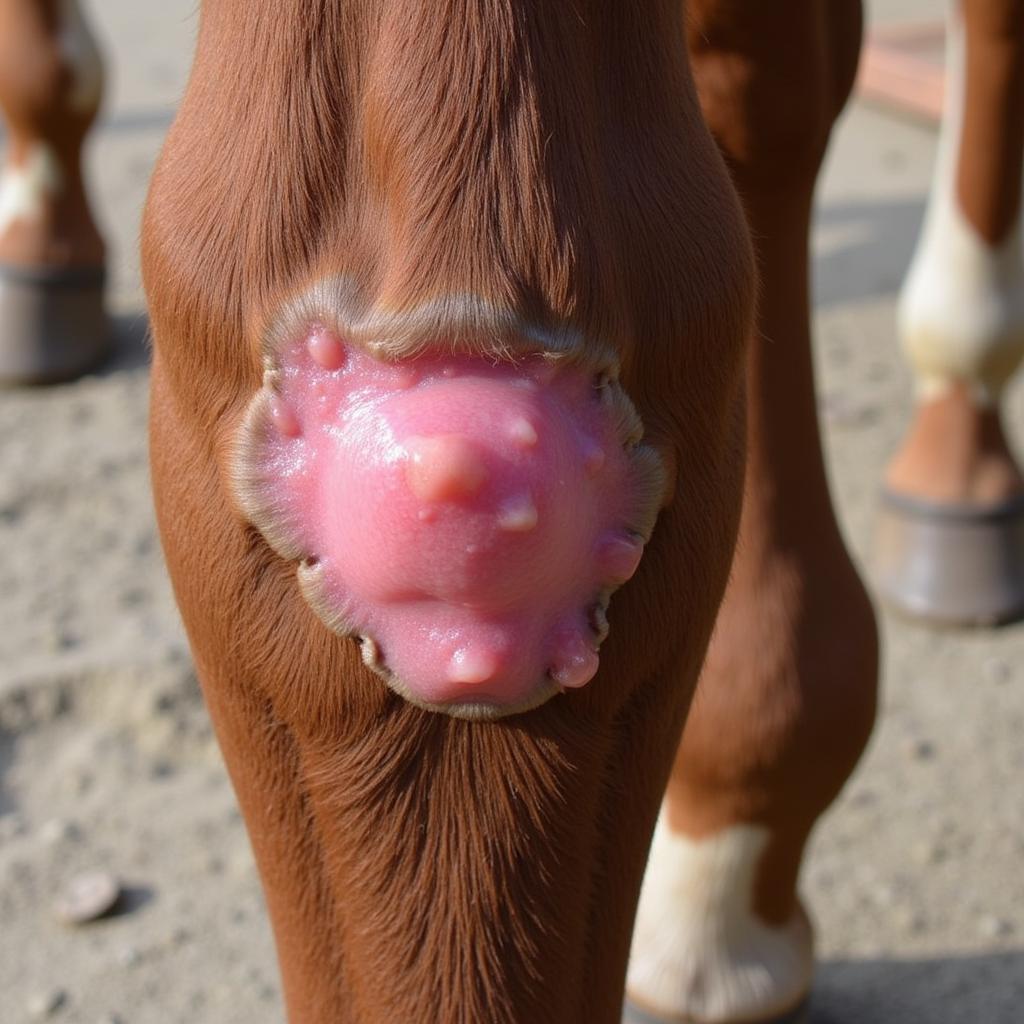Horse injection-site swelling is a common occurrence that can range from mild to severe. Understanding the causes, treatments, and preventative measures is crucial for every horse owner. This guide provides a deep dive into Horse Injection-site Swelling Treatment, offering practical advice and expert insights to help you manage this issue effectively.
Understanding Horse Injection-Site Swelling
Swelling at the injection site is a typical reaction, often indicating the body’s immune response to the injected substance. While usually minor and self-limiting, it can sometimes signal more serious complications. Recognizing the difference between normal inflammation and a potential problem is vital.
Common Causes of Swelling
- Irritant Medications: Certain medications, even when administered correctly, can irritate the tissues at the injection site.
- Improper Injection Technique: Incorrect needle placement, rapid injection, or using a dull needle can increase the risk of swelling.
- Infection: In some cases, bacteria can enter the injection site, leading to infection and significant swelling.
- Allergic Reaction: Although less common, horses can have allergic reactions to certain medications, causing localized swelling or more widespread reactions.
 Horse Showing Swelling at Injection Site
Horse Showing Swelling at Injection Site
Horse Injection-Site Swelling Treatment Options
Addressing injection-site swelling promptly and appropriately can minimize discomfort for your horse and prevent further complications. Here are some common treatment approaches:
- Cold Therapy: Applying cold compresses or ice packs to the affected area can reduce inflammation and pain during the initial stages of swelling.
- Warm Compresses: After the initial inflammation subsides (typically 24-48 hours), warm compresses can help improve circulation and promote healing.
- Hydrotherapy: Gentle hosing or soaking the area with warm water can also be beneficial.
- Topical Treatments: Applying anti-inflammatory creams or gels, as recommended by your veterinarian, may help reduce swelling.
- Systemic Medications: In cases of infection or severe allergic reactions, your veterinarian may prescribe systemic anti-inflammatories or antibiotics.
Preventing Injection-Site Swelling in Horses
Proactive measures can significantly reduce the risk of injection-site swelling in your horse.
- Proper Injection Technique: Ensure you or your veterinarian utilizes proper injection techniques, including correct needle placement, appropriate needle size, and slow injection speed.
- Sterile Procedures: Maintaining strict sterility during injections is crucial to prevent infections.
- Appropriate Medication Choice: Discussing medication options with your veterinarian can help identify the least irritating option for your horse’s specific needs.
- Observation: Carefully monitor the injection site after administration for any signs of swelling or other reactions.
When to Call the Vet
While mild swelling is often expected, certain signs warrant immediate veterinary attention.
- Excessive Swelling: Swelling that is significantly larger than a golf ball or continues to increase in size.
- Heat and Pain: The injection site feels hot to the touch and the horse exhibits signs of pain, such as lameness or reluctance to move.
- Discharge: Any pus or other discharge from the injection site indicates a potential infection.
- Systemic Signs: Fever, lethargy, or loss of appetite can suggest a more serious reaction.
“Early intervention is key when dealing with injection-site reactions,” says Dr. Emily Carter, DVM, Equine Specialist at Justus Horses USA. “Don’t hesitate to contact your veterinarian if you notice any unusual swelling or your horse shows signs of discomfort.”
Conclusion
Horse injection-site swelling treatment requires a proactive approach. By understanding the causes, treatments, and preventive measures, you can effectively manage this common issue and ensure your horse’s comfort and well-being. Remember, prompt veterinary attention is crucial if you observe any concerning signs. Proper horse injection-site swelling treatment can help your horse recover quickly and prevent long-term complications.
FAQ
- Is some swelling normal after an injection? Yes, mild swelling is often a normal reaction.
- How long does injection-site swelling typically last? Mild swelling usually resolves within a few days.
- When should I call the vet? Call your vet if the swelling is excessive, hot, painful, or accompanied by discharge or systemic signs.
- Can I give my horse pain medication? Consult your veterinarian before administering any medications.
- How can I prevent injection-site swelling? Proper injection technique and sterile procedures are key to prevention.
“Always prioritize proper injection technique and hygiene,” adds Dr. Carter. “This can drastically reduce the likelihood of complications.”
For further assistance, please contact us at Phone: 0772127271, Email: [email protected] or visit our location: QGM2+WX2, Vị Trung, Vị Thuỷ, Hậu Giang, Việt Nam. We have a 24/7 customer service team. You can also explore our other helpful articles on horse health and care on the Justus Horses USA website.